MercoPress. South Atlantic News Agency
Tag: Sao Pablo
-
Friday, May 9th 2014 - 07:35 UTC
Chaos in Sao Paulo and Rio, as protestors take to the streets 35 days ahead of the Cup

Two of Brazil's major cities which will be hosting matches of the World Cup in 35 days time, were in chaos on Thursday because of protests from the Landless Peasants and Homeless Workers in Sao Paulo and a bus drivers' strike in Rio do Janeiro.
-
Wednesday, May 7th 2014 - 07:11 UTC
Sao Paulo offers 22.000 dollars rewards to whoever turns in data on criminals
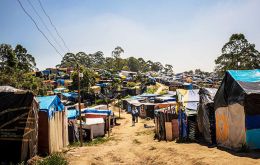
With just over a month left for the 2014 World Cup kick off in Brazil, the governor of the state of Sao Paulo launched the Regional Reward program which will pay 55.000 Reales (approximately 22.000 dollars) to anyone providing useful information to help to solve crimes and track perpetrators.
-
Thursday, May 1st 2014 - 07:22 UTC
Brazil: Protestors demanding housing block main access routes and camp outside City Council
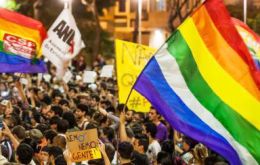
A demonstration supporting access to low-cost housing on Wednesday blocked several stretches of the Marginal Tiete, one of the main access routes to Sao Paulo, Brazil's largest city and financial capital.
-
Friday, April 11th 2014 - 08:38 UTC
Water rationing round the corner for the metropolis of Sao Paulo, admits major utility
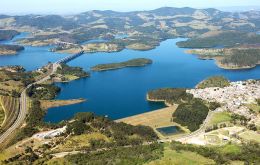
The metropolis of Sao Paulo may have to ration water this year if reservoir levels are not replenished, Brazil's largest water and sewage utility said, an increasing possibility as the southeast region heads into its dry season.
-
Tuesday, October 29th 2013 - 18:26 UTC
Night of fury in Sao Paulo: 90 detained and scores of buses and trucks torched
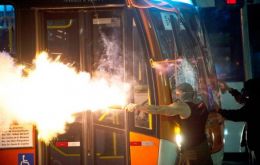
One person was injured and 90 detained while trucks and buses were torched in Sao Paulo late Monday in renewed violence after police fatally shot a 17-year-old boy. A police statement said some of the rioters made use of firearms during the unrest and added that one pedestrian was injured during the shooting and rushed to hospital by police.
-
Saturday, October 26th 2013 - 15:45 UTC
Brazil's main city again rocked by riots and vandalism over transport facilities and costs
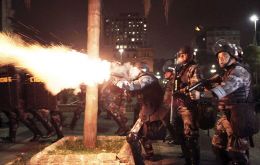
Brazilian police fired tear gas and have arrested scores of protesters in the country's main city Sao Paulo when a march demanding free public transportation for students turned violent. The protest on Friday evening blocked key city streets and disrupted the public transportation system in the city of 11 million. Police reported the arrest of at least 78 people.
-
Saturday, August 10th 2013 - 02:04 UTC
Corruption allegations in crucial Sao Paulo city reach Brazil’s main opposition party
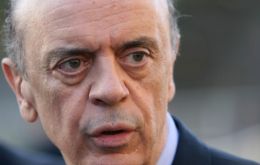
After the mensalão case rocked Brazil’s ruling party, it seems it’s now the turn of the Social Democrats (PSDB), the main opposition party. The Attorney General’s office and the police are investigating the allegations against the PSDB and if its leaders received kickbacks from a scheme involving the maintenance of train and metro lines in Sao Paulo.
-
Friday, August 2nd 2013 - 03:26 UTC
Brazil's Rousseff announces billions to improve Sao Paulo transport system

Brazilian President Dilma Rousseff moved quickly this week to improve bus services in the metropolis of Sao Paulo, where protests over a fare increase in June triggered an outburst of national discontent that battered her popularity and questioned the country’s infrastructure for two major world events in 2014 and 2016.
-
Thursday, June 20th 2013 - 02:16 UTC
Sao Paulo and Rio roll back bus fares but protests keep spreading to other cities
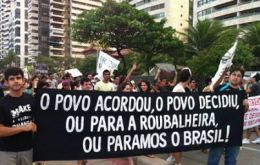
Brazil's two biggest cities agreed to revoke an increase in public transportation fares that set off demonstrations that have grown into nationwide protests against poor public services, inflation, corruption and lavish spending in stadiums to host global events.
-
Tuesday, June 18th 2013 - 07:27 UTC
Protests in Brazil against profligate spending and poor services extend to major cities

Demonstrators clashed with police in central Rio do Janeiro on Monday evening as more than 200,000 people turned out to the streets of major Brazilian cities to protest the billions of dollars spent on the Confederations Cup, higher public transport costs, corruption and poor services.
